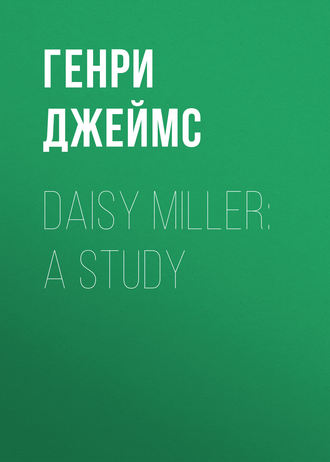
Генри Джеймс
Daisy Miller: A Study
“I am going to the Pincio,” said Daisy, smiling.
“Alone, my dear—at this hour?” Mrs. Walker asked. The afternoon was drawing to a close—it was the hour for the throng of carriages and of contemplative pedestrians. “I don’t think it’s safe, my dear,” said Mrs. Walker.
“Neither do I,” subjoined Mrs. Miller. “You’ll get the fever, as sure as you live. Remember what Dr. Davis told you!”
“Give her some medicine before she goes,” said Randolph.
The company had risen to its feet; Daisy, still showing her pretty teeth, bent over and kissed her hostess. “Mrs. Walker, you are too perfect,” she said. “I’m not going alone; I am going to meet a friend.”
“Your friend won’t keep you from getting the fever,” Mrs. Miller observed.
“Is it Mr. Giovanelli?” asked the hostess.
Winterbourne was watching the young girl; at this question his attention quickened. She stood there, smiling and smoothing her bonnet ribbons; she glanced at Winterbourne. Then, while she glanced and smiled, she answered, without a shade of hesitation, “Mr. Giovanelli—the beautiful Giovanelli.”
“My dear young friend,” said Mrs. Walker, taking her hand pleadingly, “don’t walk off to the Pincio at this hour to meet a beautiful Italian.”
“Well, he speaks English,” said Mrs. Miller.
“Gracious me!” Daisy exclaimed, “I don’t to do anything improper. There’s an easy way to settle it.” She continued to glance at Winterbourne. “The Pincio is only a hundred yards distant; and if Mr. Winterbourne were as polite as he pretends, he would offer to walk with me!”
Winterbourne’s politeness hastened to affirm itself, and the young girl gave him gracious leave to accompany her. They passed downstairs before her mother, and at the door Winterbourne perceived Mrs. Miller’s carriage drawn up, with the ornamental courier whose acquaintance he had made at Vevey seated within. “Goodbye, Eugenio!” cried Daisy; “I’m going to take a walk.” The distance from the Via Gregoriana to the beautiful garden at the other end of the Pincian Hill is, in fact, rapidly traversed. As the day was splendid, however, and the concourse of vehicles, walkers, and loungers numerous, the young Americans found their progress much delayed. This fact was highly agreeable to Winterbourne, in spite of his consciousness of his singular situation. The slow-moving, idly gazing Roman crowd bestowed much attention upon the extremely pretty young foreign lady who was passing through it upon his arm; and he wondered what on earth had been in Daisy’s mind when she proposed to expose herself, unattended, to its appreciation. His own mission, to her sense, apparently, was to consign her to the hands of Mr. Giovanelli; but Winterbourne, at once annoyed and gratified, resolved that he would do no such thing.
“Why haven’t you been to see me?” asked Daisy. “You can’t get out of that.”
“I have had the honor of telling you that I have only just stepped out of the train.”
“You must have stayed in the train a good while after it stopped!” cried the young girl with her little laugh. “I suppose you were asleep. You have had time to go to see Mrs. Walker.”
“I knew Mrs. Walker—” Winterbourne began to explain.
“I know where you knew her. You knew her at Geneva. She told me so. Well, you knew me at Vevey. That’s just as good. So you ought to have come.” She asked him no other question than this; she began to prattle about her own affairs. “We’ve got splendid rooms at the hotel; Eugenio says they’re the best rooms in Rome. We are going to stay all winter, if we don’t die of the fever; and I guess we’ll stay then. It’s a great deal nicer than I thought; I thought it would be fearfully quiet; I was sure it would be awfully poky. I was sure we should be going round all the time with one of those dreadful old men that explain about the pictures and things. But we only had about a week of that, and now I’m enjoying myself. I know ever so many people, and they are all so charming. The society’s extremely select. There are all kinds—English, and Germans, and Italians. I think I like the English best. I like their style of conversation. But there are some lovely Americans. I never saw anything so hospitable. There’s something or other every day. There’s not much dancing; but I must say I never thought dancing was everything. I was always fond of conversation. I guess I shall have plenty at Mrs. Walker’s, her rooms are so small.” When they had passed the gate of the Pincian Gardens, Miss Miller began to wonder where Mr. Giovanelli might be. “We had better go straight to that place in front,” she said, “where you look at the view.”
“I certainly shall not help you to find him,” Winterbourne declared.
“Then I shall find him without you,” cried Miss Daisy.
“You certainly won’t leave me!” cried Winterbourne.
She burst into her little laugh. “Are you afraid you’ll get lost—or run over? But there’s Giovanelli, leaning against that tree. He’s staring at the women in the carriages: did you ever see anything so cool?”
Winterbourne perceived at some distance a little man standing with folded arms nursing his cane. He had a handsome face, an artfully poised hat, a glass in one eye, and a nosegay in his buttonhole. Winterbourne looked at him a moment and then said, “Do you mean to speak to that man?”
“Do I mean to speak to him? Why, you don’t suppose I mean to communicate by signs?”
“Pray understand, then,” said Winterbourne, “that I intend to remain with you.”
Daisy stopped and looked at him, without a sign of troubled consciousness in her face, with nothing but the presence of her charming eyes and her happy dimples. “Well, she’s a cool one!” thought the young man.
“I don’t like the way you say that,” said Daisy. “It’s too imperious.”
“I beg your pardon if I say it wrong. The main point is to give you an idea of my meaning.”
The young girl looked at him more gravely, but with eyes that were prettier than ever. “I have never allowed a gentleman to dictate to me, or to interfere with anything I do.”
“I think you have made a mistake,” said Winterbourne. “You should sometimes listen to a gentleman—the right one.”
Daisy began to laugh again. “I do nothing but listen to gentlemen!” she exclaimed. “Tell me if Mr. Giovanelli is the right one?”
The gentleman with the nosegay in his bosom had now perceived our two friends, and was approaching the young girl with obsequious rapidity. He bowed to Winterbourne as well as to the latter’s companion; he had a brilliant smile, an intelligent eye; Winterbourne thought him not a bad-looking fellow. But he nevertheless said to Daisy, “No, he’s not the right one.”
Daisy evidently had a natural talent for performing introductions; she mentioned the name of each of her companions to the other. She strolled alone with one of them on each side of her; Mr. Giovanelli, who spoke English very cleverly—Winterbourne afterward learned that he had practiced the idiom upon a great many American heiresses—addressed her a great deal of very polite nonsense; he was extremely urbane, and the young American, who said nothing, reflected upon that profundity of Italian cleverness which enables people to appear more gracious in proportion as they are more acutely disappointed. Giovanelli, of course, had counted upon something more intimate; he had not bargained for a party of three. But he kept his temper in a manner which suggested far-stretching intentions. Winterbourne flattered himself that he had taken his measure. “He is not a gentleman,” said the young American; “he is only a clever imitation of one. He is a music master, or a penny-a-liner, or a third-rate artist. D__n his good looks!” Mr. Giovanelli had certainly a very pretty face; but Winterbourne felt a superior indignation at his own lovely fellow countrywoman’s not knowing the difference between a spurious gentleman and a real one. Giovanelli chattered and jested and made himself wonderfully agreeable. It was true that, if he was an imitation, the imitation was brilliant. “Nevertheless,” Winterbourne said to himself, “a nice girl ought to know!” And then he came back to the question whether this was, in fact, a nice girl. Would a nice girl, even allowing for her being a little American flirt, make a rendezvous with a presumably low-lived foreigner? The rendezvous in this case, indeed, had been in broad daylight and in the most crowded corner of Rome, but was it not impossible to regard the choice of these circumstances as a proof of extreme cynicism? Singular though it may seem, Winterbourne was vexed that the young girl, in joining her amoroso, should not appear more impatient of his own company, and he was vexed because of his inclination. It was impossible to regard her as a perfectly well-conducted young lady; she was wanting in a certain indispensable delicacy. It would therefore simplify matters greatly to be able to treat her as the object of one of those sentiments which are called by romancers “lawless passions.” That she should seem to wish to get rid of him would help him to think more lightly of her, and to be able to think more lightly of her would make her much less perplexing. But Daisy, on this occasion, continued to present herself as an inscrutable combination of audacity and innocence.
She had been walking some quarter of an hour, attended by her two cavaliers, and responding in a tone of very childish gaiety, as it seemed to Winterbourne, to the pretty speeches of Mr. Giovanelli, when a carriage that had detached itself from the revolving train drew up beside the path. At the same moment Winterbourne perceived that his friend Mrs. Walker—the lady whose house he had lately left—was seated in the vehicle and was beckoning to him. Leaving Miss Miller’s side, he hastened to obey her summons. Mrs. Walker was flushed; she wore an excited air. “It is really too dreadful,” she said. “That girl must not do this sort of thing. She must not walk here with you two men. Fifty people have noticed her.”
Winterbourne raised his eyebrows. “I think it’s a pity to make too much fuss about it.”
“It’s a pity to let the girl ruin herself!”
“She is very innocent,” said Winterbourne.
“She’s very crazy!” cried Mrs. Walker. “Did you ever see anything so imbecile as her mother? After you had all left me just now, I could not sit still for thinking of it. It seemed too pitiful, not even to attempt to save her. I ordered the carriage and put on my bonnet, and came here as quickly as possible. Thank Heaven I have found you!”
“What do you propose to do with us?” asked Winterbourne, smiling.
“To ask her to get in, to drive her about here for half an hour, so that the world may see she is not running absolutely wild, and then to take her safely home.”
“I don’t think it’s a very happy thought,” said Winterbourne; “but you can try.”
Mrs. Walker tried. The young man went in pursuit of Miss Miller, who had simply nodded and smiled at his interlocutor in the carriage and had gone her way with her companion. Daisy, on learning that Mrs. Walker wished to speak to her, retraced her steps with a perfect good grace and with Mr. Giovanelli at her side. She declared that she was delighted to have a chance to present this gentleman to Mrs. Walker. She immediately achieved the introduction, and declared that she had never in her life seen anything so lovely as Mrs. Walker’s carriage rug.
“I am glad you admire it,” said this lady, smiling sweetly. “Will you get in and let me put it over you?”
“Oh, no, thank you,” said Daisy. “I shall admire it much more as I see you driving round with it.”
“Do get in and drive with me!” said Mrs. Walker.
“That would be charming, but it’s so enchanting just as I am!” and Daisy gave a brilliant glance at the gentlemen on either side of her.
“It may be enchanting, dear child, but it is not the custom here,” urged Mrs. Walker, leaning forward in her victoria, with her hands devoutly clasped.
“Well, it ought to be, then!” said Daisy. “If I didn’t walk I should expire.”
“You should walk with your mother, dear,” cried the lady from Geneva, losing patience.
“With my mother dear!” exclaimed the young girl. Winterbourne saw that she scented interference. “My mother never walked ten steps in her life. And then, you know,” she added with a laugh, “I am more than five years old.”
“You are old enough to be more reasonable. You are old enough, dear Miss Miller, to be talked about.”
Daisy looked at Mrs. Walker, smiling intensely. “Talked about? What do you mean?”
“Come into my carriage, and I will tell you.”
Daisy turned her quickened glance again from one of the gentlemen beside her to the other. Mr. Giovanelli was bowing to and fro, rubbing down his gloves and laughing very agreeably; Winterbourne thought it a most unpleasant scene. “I don’t think I want to know what you mean,” said Daisy presently. “I don’t think I should like it.”
Winterbourne wished that Mrs. Walker would tuck in her carriage rug and drive away, but this lady did not enjoy being defied, as she afterward told him. “Should you prefer being thought a very reckless girl?” she demanded.
“Gracious!” exclaimed Daisy. She looked again at Mr. Giovanelli, then she turned to Winterbourne. There was a little pink flush in her cheek; she was tremendously pretty. “Does Mr. Winterbourne think,” she asked slowly, smiling, throwing back her head, and glancing at him from head to foot, “that, to save my reputation, I ought to get into the carriage?”
Winterbourne colored; for an instant he hesitated greatly. It seemed so strange to hear her speak that way of her “reputation.” But he himself, in fact, must speak in accordance with gallantry. The finest gallantry, here, was simply to tell her the truth; and the truth, for Winterbourne, as the few indications I have been able to give have made him known to the reader, was that Daisy Miller should take Mrs. Walker’s advice. He looked at her exquisite prettiness, and then he said, very gently, “I think you should get into the carriage.”
Daisy gave a violent laugh. “I never heard anything so stiff! If this is improper, Mrs. Walker,” she pursued, “then I am all improper, and you must give me up. Goodbye; I hope you’ll have a lovely ride!” and, with Mr. Giovanelli, who made a triumphantly obsequious salute, she turned away.
Mrs. Walker sat looking after her, and there were tears in Mrs. Walker’s eyes. “Get in here, sir,” she said to Winterbourne, indicating the place beside her. The young man answered that he felt bound to accompany Miss Miller, whereupon Mrs. Walker declared that if he refused her this favor she would never speak to him again. She was evidently in earnest. Winterbourne overtook Daisy and her companion, and, offering the young girl his hand, told her that Mrs. Walker had made an imperious claim upon his society. He expected that in answer she would say something rather free, something to commit herself still further to that “recklessness” from which Mrs. Walker had so charitably endeavored to dissuade her. But she only shook his hand, hardly looking at him, while Mr. Giovanelli bade him farewell with a too emphatic flourish of the hat.
Winterbourne was not in the best possible humor as he took his seat in Mrs. Walker’s victoria. “That was not clever of you,” he said candidly, while the vehicle mingled again with the throng of carriages.
“In such a case,” his companion answered, “I don’t wish to be clever; I wish to be EARNEST!”
“Well, your earnestness has only offended her and put her off.”
“It has happened very well,” said Mrs. Walker. “If she is so perfectly determined to compromise herself, the sooner one knows it the better; one can act accordingly.”
“I suspect she meant no harm,” Winterbourne rejoined.
“So I thought a month ago. But she has been going too far.”
“What has she been doing?”
“Everything that is not done here. Flirting with any man she could pick up; sitting in corners with mysterious Italians; dancing all the evening with the same partners; receiving visits at eleven o’clock at night. Her mother goes away when visitors come.”
“But her brother,” said Winterbourne, laughing, “sits up till midnight.”
“He must be edified by what he sees. I’m told that at their hotel everyone is talking about her, and that a smile goes round among all the servants when a gentleman comes and asks for Miss Miller.”
“The servants be hanged!” said Winterbourne angrily. “The poor girl’s only fault,” he presently added, “is that she is very uncultivated.”
“She is naturally indelicate,” Mrs. Walker declared.
“Take that example this morning. How long had you known her at Vevey?”
“A couple of days.”
“Fancy, then, her making it a personal matter that you should have left the place!”
Winterbourne was silent for some moments; then he said, “I suspect, Mrs. Walker, that you and I have lived too long at Geneva!” And he added a request that she should inform him with what particular design she had made him enter her carriage.
“I wished to beg you to cease your relations with Miss Miller—not to flirt with her—to give her no further opportunity to expose herself—to let her alone, in short.”
“I’m afraid I can’t do that,” said Winterbourne. “I like her extremely.”
“All the more reason that you shouldn’t help her to make a scandal.”
“There shall be nothing scandalous in my attentions to her.”
“There certainly will be in the way she takes them. But I have said what I had on my conscience,” Mrs. Walker pursued. “If you wish to rejoin the young lady I will put you down. Here, by the way, you have a chance.”
The carriage was traversing that part of the Pincian Garden that overhangs the wall of Rome and overlooks the beautiful Villa Borghese. It is bordered by a large parapet, near which there are several seats. One of the seats at a distance was occupied by a gentleman and a lady, toward whom Mrs. Walker gave a toss of her head. At the same moment these persons rose and walked toward the parapet. Winterbourne had asked the coachman to stop; he now descended from the carriage. His companion looked at him a moment in silence; then, while he raised his hat, she drove majestically away. Winterbourne stood there; he had turned his eyes toward Daisy and her cavalier. They evidently saw no one; they were too deeply occupied with each other. When they reached the low garden wall, they stood a moment looking off at the great flat-topped pine clusters of the Villa Borghese; then Giovanelli seated himself, familiarly, upon the broad ledge of the wall. The western sun in the opposite sky sent out a brilliant shaft through a couple of cloud bars, whereupon Daisy’s companion took her parasol out of her hands and opened it. She came a little nearer, and he held the parasol over her; then, still holding it, he let it rest upon her shoulder, so that both of their heads were hidden from Winterbourne. This young man lingered a moment, then he began to walk. But he walked—not toward the couple with the parasol; toward the residence of his aunt, Mrs. Costello.
He flattered himself on the following day that there was no smiling among the servants when he, at least, asked for Mrs. Miller at her hotel. This lady and her daughter, however, were not at home; and on the next day after, repeating his visit, Winterbourne again had the misfortune not to find them. Mrs. Walker’s party took place on the evening of the third day, and, in spite of the frigidity of his last interview with the hostess, Winterbourne was among the guests. Mrs. Walker was one of those American ladies who, while residing abroad, make a point, in their own phrase, of studying European society, and she had on this occasion collected several specimens of her diversely born fellow mortals to serve, as it were, as textbooks. When Winterbourne arrived, Daisy Miller was not there, but in a few moments he saw her mother come in alone, very shyly and ruefully. Mrs. Miller’s hair above her exposed-looking temples was more frizzled than ever. As she approached Mrs. Walker, Winterbourne also drew near.
“You see, I’ve come all alone,” said poor Mrs. Miller. “I’m so frightened; I don’t know what to do. It’s the first time I’ve ever been to a party alone, especially in this country. I wanted to bring Randolph or Eugenio, or someone, but Daisy just pushed me off by myself. I ain’t used to going round alone.”
“And does not your daughter intend to favor us with her society?” demanded Mrs. Walker impressively.
“Well, Daisy’s all dressed,” said Mrs. Miller with that accent of the dispassionate, if not of the philosophic, historian with which she always recorded the current incidents of her daughter’s career. “She got dressed on purpose before dinner. But she’s got a friend of hers there; that gentleman—the Italian—that she wanted to bring. They’ve got going at the piano; it seems as if they couldn’t leave off. Mr. Giovanelli sings splendidly. But I guess they’ll come before very long,” concluded Mrs. Miller hopefully.
“I’m sorry she should come in that way,” said Mrs. Walker.
“Well, I told her that there was no use in her getting dressed before dinner if she was going to wait three hours,” responded Daisy’s mamma. “I didn’t see the use of her putting on such a dress as that to sit round with Mr. Giovanelli.”
“This is most horrible!” said Mrs. Walker, turning away and addressing herself to Winterbourne. “Elle s’affiche. It’s her revenge for my having ventured to remonstrate with her. When she comes, I shall not speak to her.”
Daisy came after eleven o’clock; but she was not, on such an occasion, a young lady to wait to be spoken to. She rustled forward in radiant loveliness, smiling and chattering, carrying a large bouquet, and attended by Mr. Giovanelli. Everyone stopped talking and turned and looked at her. She came straight to Mrs. Walker. “I’m afraid you thought I never was coming, so I sent mother off to tell you. I wanted to make Mr. Giovanelli practice some things before he came; you know he sings beautifully, and I want you to ask him to sing. This is Mr. Giovanelli; you know I introduced him to you; he’s got the most lovely voice, and he knows the most charming set of songs. I made him go over them this evening on purpose; we had the greatest time at the hotel.” Of all this Daisy delivered herself with the sweetest, brightest audibleness, looking now at her hostess and now round the room, while she gave a series of little pats, round her shoulders, to the edges of her dress. “Is there anyone I know?” she asked.





